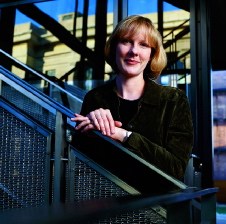 |
| Heather Gerken |
| Photograph by Stu Rosner |
When the election of a president appeared to hang in the balance, the media came knocking at Heather Gerken's door. An assistant professor at Harvard Law School, Gerken "ended up on television last year because all the famous people here were litigating Bush v. Gore," she says, laughing. The truth is, she is an expert on election law and had joined the faculty just a few months before the controversy began. In her role as pundit, she took pains to be "objective and neutral," but says the Supreme Court majority's claim that they had to take the case was "incorrect--even after they had taken the case, they could have left the decision to democratic institutions." Of their equal protection argument, she says, "If the Supreme Court wants us to work to defend its legitimacy, it needs to give us something to work with. The right way to remedy the violation they identified would have been to have a recount under a uniform standard--you don't say, 'We're not going to count at all.'" Gerken became interested in election law when, as editor in chief of the Michigan Law Review, she published the first symposium on the 1993 racial gerrymander case Shaw v. Reno and realized how many unexplored intellectual puzzles were involved. After a Supreme Court clerkship for Justice David Souter, Gerken joined a Washington, D.C., firm specializing in such law. During her student years, weighing the pros and cons of Cantabrigia, Gerken twice turned down Harvard offers of admission, first to the College and then to the Law School. But when Harvard asked for a recount in 2000, Gerken reconsidered. "The third time," she says, "proved to be the charm."




